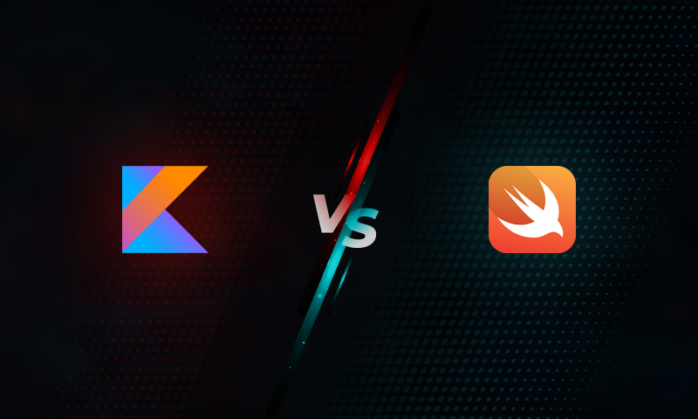
Android and iOS are the world’s top mobile operating systems, dominating the global market. Every year, thousands of apps are developed for both, generating billions of dollars in revenue for app developers. The competition in the application market is fierce, with developers constantly striving to create something innovative and unique.
Some developers create apps for Android and iOS to maximize their reach and potential user base. This is a great strategy, but it usually requires the developers to have expertise in different programming languages and frameworks specific to each operating system.
Kotlin and Swift: A Short Overview
Kotlin and Swift are two popular programming languages commonly used for mobile app development. Kotlin developed by JetBrains is favored for backend, web, and app development. It is known for its concise syntax and compatibility with Java, making it a popular choice among Android developers.
On the other hand, Swift is specifically designed for Apple products and is mainly used for iOS and macOS. While it is not one of the most widely used programming languages, it has gained popularity among Apple developers due to its intuitive syntax and grammar and powerful features and performance.

Is Kotlin Better Than Swift?
This is a valid question, though the answer mostly depends on the developer’s preferences and project requirements. For some, Kotlin will be a better choice due to its compatibility with Java and popularity in the Android community; others may prefer Swift for its seamless integration with Apple products and its great performance on iOS and macOS.
Let’s compare a few key aspects of Kotlin and Swift to better understand the main differences and similarities.
Syntax and readability
As we have previously stated, Swift is known for its clean and concise syntax, making it easier for developers (especially beginners) to understand it. The basic idea of Swift came from Objective-C, Rust, Ruby, and Python, so it incorporates some concepts familiar from these languages. This makes it more approachable to people who have already had experience with one of these.
Kotlin’s syntax is also considered easy to learn and read. It draws inspiration from languages like Java, Scala, and Groovy. Some coders may find Kotlin’s syntax to be more verbose than Swift’s. Kotlin’s syntax includes features such as null safety and extension functions, which can enhance productivity and code quality.

Performance and speed
Swift is a high-performing language that is known for its speed and efficiency. However, it requires a bit more memory compared to Kotlin. This means that Kotlin will likely be a better choice for resource-constrained environments and devices with limited memory.
Swift manages memory automatically, while Kotlin requires manual memory management. This can be both an advantage and a drawback, depending on the project’s needs. For developers who prefer more control, the manual approach will be preferred.
In terms of speed, Swift is generally faster than Kotlin due to its optimized performance. Swift simplifies the creation of multitasking applications, which is called concurrency. This can greatly improve the efficiency and responsiveness of the final product.
Community and Job Opportunities
Swift, being the preferred language of iOS developers, has a bigger community in terms of developing software for Apple products. This means that Swift developers can benefit from a large pool of resources, tutorials, and online forums. There are over 330,000 questions tagged “swift” on StackOverflow, and most of them have been answered by experienced developers.
According to the TIOBE Index, Kotlin is more popular in terms of the number of developers, companies providing support, and job opportunities. The language has a thriving community, with numerous online forums, tutorials, and resources available, especially among Android developers. Many custom mobile application development companies offer Kotlin development services as part of their portfolio, showcasing the demand for Kotlin expertise in the market.

What Does The Future Hold for Kotlin and Swift?
Future perspectives for Kotlin look promising as it continues to gain traction in the industry. More businesses will likely use Kotlin for their Android app development projects thanks to its compatibility with Java and its concise syntax. Additionally, Google officially supports Kotlin as a first-class language for Android development, which says a lot about the potential it has for becoming even more popular in the future.
Swift is also expected to have a bright future ahead. As the preferred programming language for app development for iOS, it has a lot of benefits for people who have already decided that they want to develop software for Apple products.
Android vs. iOS Development
Overall, the Android vs. iOS app development debate is ongoing and endless, as is the Kotlin vs. Swift one. Both of these operating systems have their own strengths and weaknesses, and the same applies to the programming languages showcased in this article.
Some software development companies choose to develop apps for both operating systems. Many hire developers who know both languages and work on projects for both iOS and Android. This allows companies to cater to a larger audience and the final product to reach more users while also delivering native look and feel for both teams.
For businesses, having apps available on both iOS and Android can be crucial for maximizing their market potential. That is why software development companies must ensure their developers are proficient in coding in multiple languages.

Kotlin vs Swift: Which Language to Choose?
Ultimately, the choice between Kotlin and Swift depends on the specific preferences of the developer and project requirements. While Android developers often choose Kotlin because of its seamless integration with Java and extensive library support, Swift is praised for its simplicity and performance in the iOS environment.
Developers should follow the latest industry news to stay on top of any updates or advancements in both Kotlin and Swift. The choice of which is better to learn or use for your project is ultimately a very subjective one and should be based on meticulous research and evaluation of the specific requirements and goals of the project.











